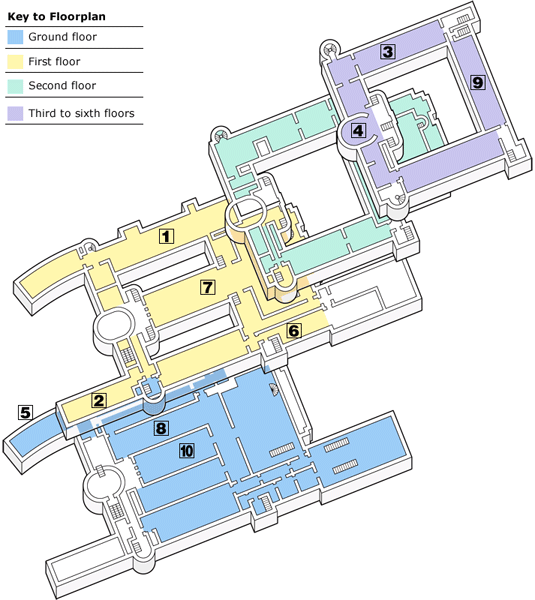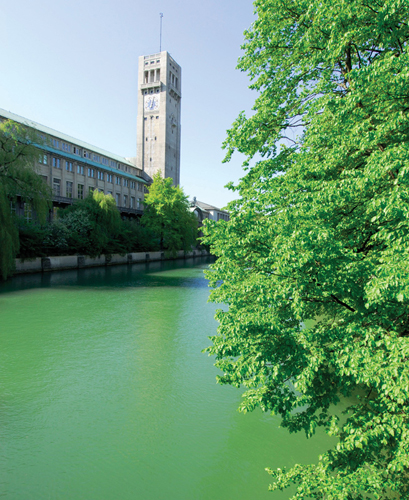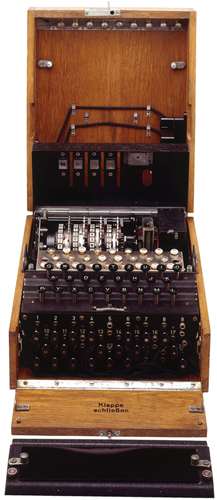The Deutsches Museum, founded by Oskar von Miller in
1903, is housed on an island in the Isar River in a building dating from
1925. The world’s largest museum of technology and engineering is a
tour de force – only a fraction of the exhibits can be viewed in a
single day. The best approach is to plan your visit in advance.
Museumsinsel 1 S-Bahn: Isartor (all lines), U1/U2: Fraunhoferstraße, Tram: 17, 18 089 21 79 1
www.deutschesmuseum.de
Open 9am–5pm daily (some departments until 8pm Thu) Closed 1 Jan, Shrove Tue, Good Fri, 1 May, 1 Nov, 21 Dec, 24–25 Dec, 31 Dec
|
|
The museum’s 17,000
exhibits are displayed over six floors. The lower floors feature heavy
vehicles and sections dealing with chemistry, physics, scientific
instruments, and aviation. The middle floors are dedicated to the
decorative arts, and the upper floors are devoted to astronomy,
information technology, and microelectronics. The Zeiss Planetarium is
located in the dome on the sixth floor.
|

Floorplan of the Deutsches Museum

The museum on Museums- Insel in the Isar River
|
A good alternative to
the museum cafeteria is Café im Volksbad in the Müller Baths, a splendid
Art Nouveau building across from the museum.
|
|
|
The museum shop sells model kits (including robots), games, building sets, instruments, posters, and books.
|
|
|
Laser shows are presented in the Zeiss Planetarium on the sixth floor; tickets for these events are sold separately.
|
|
Top 10 SightsGalileo’s Workshop In
the Physics section, a reconstruction of Galileo’s workshop features a
large collection of equipment used by the famous astronomer and
physicist. Pharmaceuticals The highlight of this section, opened in 2000, is a model of a human cell magnified 350,000 times. Enigma Machine The Enigma encoding machine, built during World War II, is a fine example of early information technology.

Zeiss Planetarium Projected
onto the 15-m (49-ft) dome of the sixth floor are the sun, the moon,
the planets, constellations, and nebulae, as well as the more than 5,000
fixed stars visible to the naked eye. Mining Exhibits on mining technology over five centuries are featured in the mining section. Musical Instruments Sounds for Hitchcock’s The Birds were created on the trautonium. Aviation and Space Travel Dozens
of airplanes are on display, including an original by the Wright
brothers and the famous Junkers JU-52. You can even board some planes.
More exhibits on travel are housed at Flugwerft Schleißheim, a branch
museum. Power Machinery Steam
engines, motor engines, and turbines are to be found here. Some of
these colossal machines, like the Alban high-pressure steam engine are
veritable works of art. Telecommunications Superb
exhibits such as the first 19th-century telegraph, Thomas Edison’s
gramophone, and a 1913 AEG transmitter are displayed here, along with
the latest in communications technology. Marine Navigation Along
with countless model ships, the vast exhibition hall features several
original sail- and steamboats, such as the 1932 steam tugboat Renzo and
the wooden fishing vessel Ewer Maria.
Deutsches Museum Collections
Physics & Astronomy The
physics section features mechanical aids such as pulleys, pumps, and
measuring and observation devices – including Foucault’s pendulum, which
featured in Umberto Eco’s eponymous novel. A sense of the size and age
of our universe is conveyed in the astronomy section. Clocks, Chemistry, Pharmaceuticals & Environment Examples
of traditional craftsmanship are on display in the extensive clock and
watch exhibit. In the chemistry section, famous experiments and a
reconstruction of Justus von Liebig’s laboratory fascinate visitors.
Rooms dedicated to pharmaceuticals show the evolution of drug research.
Ecological issues are dealt with in the environment exhibit. Mining, Metallurgy, & Agriculture In
the basement, a re-created mine is complemented by exhibits on the more
than 12,000-year-old history of metallurgy. The agriculture section
demonstrates the cultivation of cereals and grain, brewing, and sugar
refining. Glass Ceramics, & Machine Tools In
this section, materials and production techniques used in a variety of
industries are on display. These include exhibits demonstrating glass
and paper manufacture; the range of ceramics manufacture, from bricks to
fine china; and tools from Stone Age drills to computer-controlled
lathes. Energy Technology From
original windmills to plasma- and fusion-technology, this section
features inventions that facilitate everyday life. The huge steam
engines and high-voltage experiments are not to be missed. Communications In
addition to telegraph and radio equipment, this department includes
sections on printing technology, photography, and film. Visitors can
marvel at room-sized computers from the 1940s and 1950s. Marine Navigation Numerous
models of ships illustrate several millennia of marine navigation. The
rescue cruiser Theodor Heuss is displayed in the open-air exhibition
space to the south of the museum. Aviation and Space Travel In
the vast hall, 220 years of aviation history are re-created – from the
Montgolfier brothers’ hot-air balloons to modern jets. The space travel
section includes a replica of the Spacelab. Civil Engineering An
authentic suspension bridge dominates the exhibition hall; wall-mounted
screens track the oscillations as visitors venture onto and then cross
over this swaying bridge. Kid’s Kingdom Reserved
exclusively for children and accompanying adults, this section is
designed for young scientists, ages three and up. Interactive exhibits
let children experience phenomena such as communication, energy, optics,
and acoustics. The Technical Toys section offers welcome relaxation
after all the hands-on research.
|
This selection represents a fraction of the highlights – there are many more, such as a reconstruction of the Altamira cave.
|
|
The Branch Museums
Flugwerft Schleißheim,
the Deutsches Museum’s branch museum on the history of aviation, is
located in an old airplane hanger on a historic airfield in Schleißheim ( Effnerstraße 18, Oberschleißheim; 089
31 57 14 0). In addition to the old buildings and the airfield itself,
this site offers 7,800 sq m (84,000 sq ft) of exhibition space housing
over 50 airplanes, helicopters, and hang-gliders, as well as instruments
and equipment. There are special exhibitions, children’s tours, and
expert-guided tours. The museum also has a shop and a restaurant –
Pegasus – that serves as a year-round venue for exhibitions by young
artists.
The Verkehrszentrum, or Transportation Centre, was opened in 2003 on the Theresienhöhe ( Theresienhöhe 14a; 089
500 80 61 40). Three heritage-protected halls, once home to the Munich
Fair, now house historic locomotives, automobiles, carriages, and
bicycles. With this branch museum, the Deutsches Museum has created the
largest transportation museum in the world, offering a detailed and
comprehensive exploration of urban transportation, travel, mobility, and
transportation technology. Special exhibitions and lectures round out
the programme.
Top 10 Aviation & TransportationFokker D VII, fighter aircraft (World War I) Douglas DC-3, commercial aircraft, 1943 Heinkel He 111, bomber aircraft (World War II) Lockheed F-104 Starfighter Dornier Do31, vertical lift-off aircraft Puffing Billy (first locomotive in the world) Benz motorcar (first automobile in the world) Rumpler “Tropfenwagen” (aerodynamic car, 1921) NSU Delphin III motorcycle, 1956
|